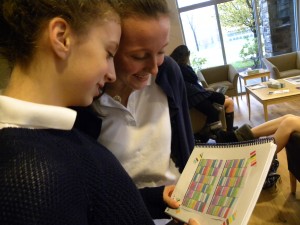Brooke Kelly ’18: The new schedule that will be in effect the next school year has finally been confirmed after many conversations, debate, and student forums. This schedule contains many changes from Episcopal’s current school-day routine, including revisions in the number and arrangement of class periods.
Currently, a typical day for an Episcopal student consists of seven academic blocks, each consuming forty to forty-five minutes out of the day. The new schedule includes fewer blocks per day with each block lasting a longer period of time. Five classes may take place everyday for fifty-five to sixty minutes each. This means students would need to complete homework for five classes as opposed to seven. Dr. Cathy Hall, Assistant Head of School, explains that the extra time in classes will allow teachers and students to go into greater depth and feel less hurried from one class to the next.
In addition to this alteration, the existing twelve-day cycle will turn into an eight-day cycle. Classes would only meet six out of these eight days; however, there will be an extended period for each class in the eight-day cycle. Dr. Delvin Dinkins, Head of the Upper School, explains, “Instead of all classes meeting for fifty-five or sixty minutes one day a week, you would have the equivalent of a double period, like an 80 minute class, where you might do projects and have other kinds of interesting learning opportunities beyond what you currently do.”
This schedule is drastically different from the school day routine students participate in today; however, some aspects of the schedule will remain the same. Hall states, “There is nothing embedded in this that is a huge detour from what we have always done. The basics of our schedule, our program, and the way it [school] will feel day-to-day by in large will be very much the same, it should just feel better.”
Despite the changes in the arrangement of classes, the new schedule still includes time for chapel, advisory, and activity. The period, in which these activities take place, now thirty minutes, will be twice as long. Half of this period will be for the designated activity, such as chapel or advisory, while the other half would be considered a break or a time for clubs to meet. During a student forum to discuss the changes, Bella Merchant ‘17 brought up her concerns about how the changes will affect club meetings. “I think that this kills a lot of the clubs because a lot of them meet at lunch which is a period when kids are not stressing out about studying. I never go to clubs during activity because I rely on that time to study or do work, so I feel like this new sliding lunch will cause people to stop going to clubs.”

Photo Courtesy of Minjee Cho ’19
Hall addressed this worry by explaining how free periods will exist in the new schedule. “Part of what is different is with the new schedule is that you should have much more built-in free time. Because there are eight possible class blocks, but students can’t have more than seven classes, and most have six, which means right out of the gates you have two of those eight opportunities that are always going to be free.” Time for homeroom and domino block will continue to be a part new schedule as well, and while free periods will still be present, classes will not drop, as that feature is already embedded in the schedule.
The technical changes will lead to adjustments in the pace of the school day. One of the intentions motivating the change in the length of classes is to slow down the normally fast-paced day. Administrators are also considering altering the five-minute passing time between classes. A possibility for this change is to eliminate the time period completely, allowing students time to get to class without a set time limit.
Episcopal faculty from the Lower, Middle, and Upper Schools met to discuss the academic and educational priorities at EA. The decision to create a new schedule resulted from discussing whether the current schedule assists in facilitating Episcopal’s program. Faculty committees studied both the strengths and weaknesses of the current schedule and acknowledged that a major drawback of the schedule is its hectic nature and inflexibility. Hall agreed with this and states, “There is much more flexibility in this schedule than what we have currently and I think that is going to be an enormous advantage.”
The committees studied the schedules of other schools, both on local and national levels, and how reforming Episcopal’s schedule could benefit the school. Eventually a suggestion was made to the administration. The administration then brought in a consultant who made recommendations about EA’s plan of action. Dinkins remarks, “We batted around those recommendations and came to a determination that having a different schedule would be best for our school.”